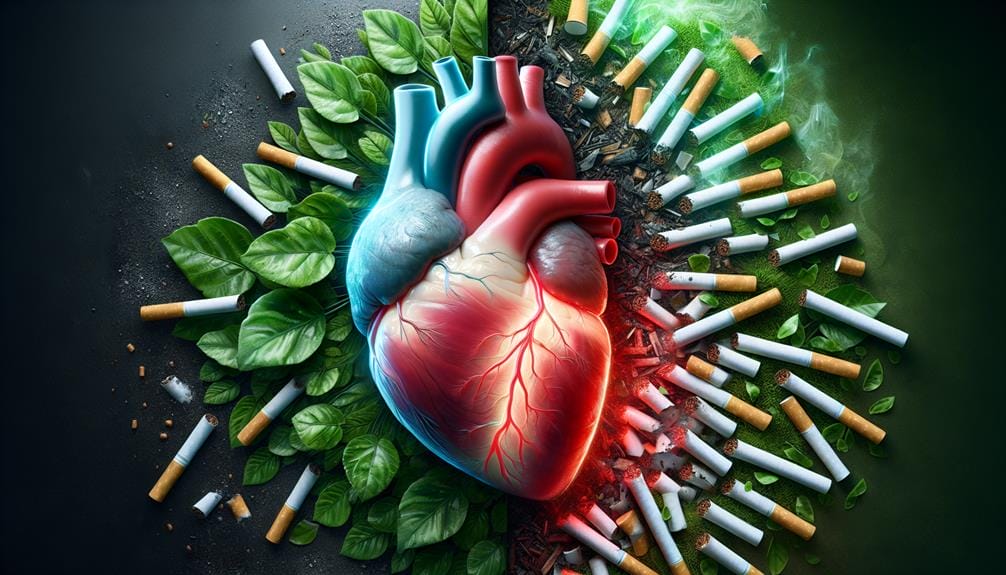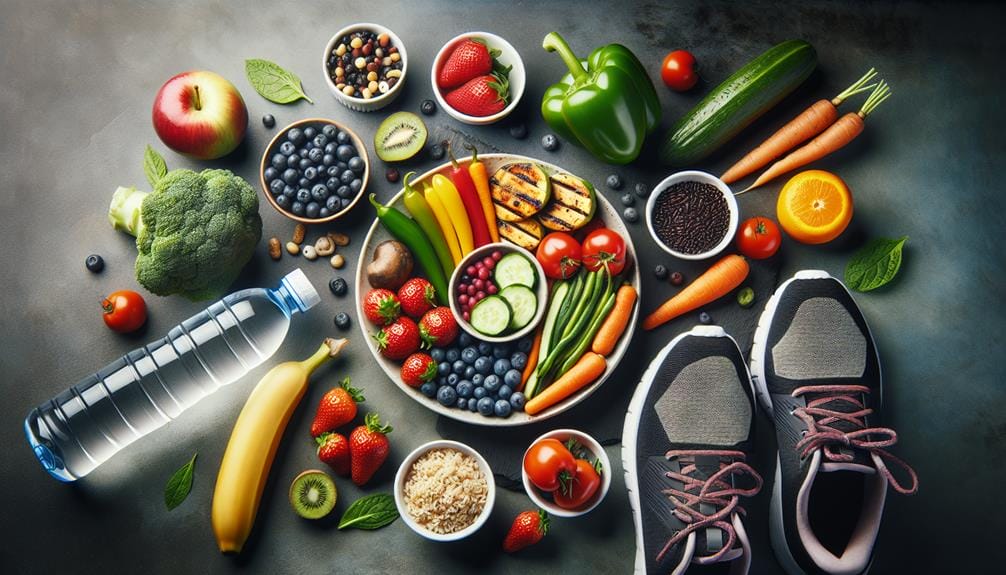To keep your cardiovascular system strong, follow these tips. Quit smoking and avoid tobacco products, as they harm your heart. Exercise routinely, aiming for 150 minutes of moderate-intensity activity per week, like brisk walking or swimming. Eat a balanced diet rich in fruits and vegetables, and maintain a healthy weight. Monitor your blood pressure, cholesterol, and blood sugar levels regularly. Manage stress through techniques like deep breathing or meditation. Limit alcohol consumption to reduce heart stress. Finally, schedule regular doctor visits for health screenings and early detection of potential issues. To explore more, let's discuss additional strategies.
Key Takeaways
- Maintain a healthy weight through diet and regular exercise to reduce the risk of heart disease.
- Monitor blood pressure, cholesterol, and blood sugar levels regularly to catch and manage heart disease risk factors early.
- Avoid smoking and limit alcohol consumption to protect your cardiovascular system.
- Engage in at least 150 minutes of moderate-intensity exercise each week, including strength training.
- Manage stress through techniques like deep breathing, meditation, and social support to benefit heart health.
Understand Heart Disease
To understand heart disease, you first need to know that coronary heart disease (CHD) is the most common type caused by plaque buildup in the arteries.
Think of your arteries as the highways of your body, and plaque as the annoying traffic jams.
Risk factors for heart disease include high cholesterol, high blood pressure, smoking, diabetes, and obesity—basically, the greatest hits of unhealthy living.
Signs of a heart attack can sneak up on you like a bad pop quiz, so be on the lookout for chest pain, discomfort, and shortness of breath.
Prevention of heart disease is your best bet; quit smoking, maintain a healthy weight, and control your cholesterol and blood pressure.
It's like giving your heart a VIP pass to a longer life.
Recognize Heart Attack Signs

Recognizing the signs of a heart attack can make all the difference in getting the immediate help you need.
Imagine you're chilling, and suddenly, bam! You feel chest pain that won't quit. It's not just heartburn from that extra slice of pizza.
Shortness of breath might make you feel like you just ran a marathon—without the fun part. If nausea or lightheadedness joins the party, your body's sending a serious SOS.
And let's not forget, sweating like you've been in a sauna. Remember, women might experience symptoms like fatigue or back pain too.
Knowing these signs of a heart attack can be your superhero move, getting you the help you need pronto.
Stay alert, stay alive!
Call 911 in Emergencies
If you suspect a heart attack, don't hesitate—call 911 immediately.
Prompt medical attention from paramedics can make all the difference in survival and recovery.
Quick response and transport to a hospital can prevent further damage to the heart muscle.
Recognize Heart Attack Symptoms
Spotting the common symptoms of a heart attack, like chest pain and shortness of breath, can make a critical difference in getting timely medical help.
Imagine you're chilling on the couch, watching TV, and suddenly, bam! Chest pain hits, and you're gasping for air like a fish out of water. Don't brush it off! Recognize heart attack symptoms and take immediate action.
Feeling discomfort in your upper body? Experiencing nausea or cold sweats? It's time to seek medical evaluation. Women, keep an eye out for sneaky symptoms like extreme fatigue, back pain, or jaw pain. Remember, when in doubt, it's better to call 911 and get checked out. Your heart will thank you!
Immediate Response Actions
In the event of a heart attack, every second counts, so don't hesitate to call 911 immediately for help. Seriously, put down the phone and use it for its intended purpose—summoning prompt medical assistance!
Recognizing an emergency is half the battle. Quick action can save lives by reducing damage to the heart muscle. If you feel chest pain, shortness of breath, or dizziness, calling 911 brings the cavalry—emergency medical services who know their stuff.
They'll provide timely and appropriate care faster than you can say 'cardiovascular emergency.' So, don't play hero; let the professionals handle it. Remember, every minute counts when you're dealing with a heart attack, and dialing 911 could make all the difference.
Know Your Health Numbers

Knowing your health numbers is essential for keeping your heart in top shape. Make it a habit to monitor your blood pressure, check your cholesterol levels, and track your blood sugar regularly.
These numbers provide important insights into your cardiovascular health and help you take proactive steps to prevent heart disease.
Monitor Blood Pressure Regularly
Regularly checking your blood pressure is essential for maintaining a healthy heart and preventing serious health issues. Keeping it in the healthy range (less than 120/80 mm Hg) reduces your risk of heart disease and stroke. Knowing your numbers helps you make informed decisions about your heart health. Small lifestyle changes, like eating right and exercising, can help lower high blood pressure. If your numbers resemble a phone number, it's time for a chat with your healthcare provider!
| Blood Pressure Level | Systolic (mm Hg) | Diastolic (mm Hg) |
|---|---|---|
| Normal | < 120 | < 80 |
| Elevated | 120-129 | < 80 |
| Hypertension Stage 1 | 130-139 | 80-89 |
Stay proactive and keep those numbers in check!
Check Cholesterol Levels
Just as you keep an eye on your blood pressure, it's important to regularly check your cholesterol levels to safeguard your heart health.
Think of it as a spy mission against plaque buildup. Your LDL cholesterol is the sneaky villain you want to keep under 100 mg/dL, while your HDL cholesterol is like the superhero—you need it above 60 mg/dL to protect your heart.
Aim for total cholesterol levels below 200 mg/dL to keep your ticker in top shape. Regular checks can help you dodge heart disease and stroke, and who doesn't want to be a heart health superhero?
Track Blood Sugar
Monitoring your blood sugar levels is essential for preventing heart disease and effectively managing diabetes. Think of it as keeping your inner sugar monster in check.
High blood sugar is like a wrecking ball for your blood vessels, leading to heart complications. Regular checks let you fine-tune your treatment plans, ensuring your numbers stay in the healthy range. It's like giving your heart a VIP pass to longevity.
Plus, understanding your blood sugar levels helps you dodge those diabetes-related heart issues. So, grab that glucose monitor, and make it your new best friend. Your heart will thank you, and you might even impress your doctor with your stellar health numbers!
Consult Your Doctor Regularly

Consulting your doctor regularly is crucial for monitoring your heart health and catching potential issues early. Think of your doctor as your heart's personal trainer, minus the sweat and spandex.
Regular health screenings can assess your risk factors for heart disease and help tailor prevention strategies just for you.
Got concerns or odd symptoms? Don't play the guessing game. Talk to your doctor. They can provide timely interventions and treatments that keep your cardiovascular health in tip-top shape.
Plus, establishing a strong relationship with your healthcare provider guarantees you're not just managing your heart, but your overall well-being too. So, make those appointments and keep your heart—and your doctor—happy!
Eat Heart-Healthy Foods

After ensuring your heart is in good hands with regular doctor visits, the next step is to fuel it with heart-healthy foods. Think of your heart as a VIP; it deserves the best! Load up on omega-3 fatty acids, which you can find in salmon and avocados. These powerhouses support cardiovascular health.
Go for high-fiber foods such as beans and oats to help lower bad cholesterol. And don't forget to keep things low in saturated fats to avoid clogging those arteries. Need a sweet treat? Dark chocolate, in moderation, is your friend thanks to its antioxidants.
Here's a quick list to get you started:
- Salmon and avocados: Rich in omega-3 fatty acids
- Beans and oats: High-fiber foods
- Dark chocolate: Packed with antioxidants
Limit Alcohol Intake

Limiting your alcohol intake is essential for maintaining a healthy heart. Drinking moderately, meaning up to one drink per day for women and two for men, can help you avoid high blood pressure and heart disease.
Drink Moderately, Stay Healthy
Moderate your alcohol intake to protect your heart and overall health. Drinking alcohol at moderate levels—up to one drink per day for women and up to two for men—can help you avoid some serious health issues. Excessive drinking increases the risk of heart disease, weight gain, and other cardiovascular problems.
Think of your heart like a car engine; too much fuel (alcohol) and it sputters. Here's what happens when you overindulge:
- You risk high blood pressure, which stresses your heart.
- Weight gain from those extra calories can lead to heart disease.
- Your liver works overtime, leaving less energy for other essential organs.
Alcohol's Heart Impact
Your heart benefits tremendously when you limit alcohol intake to the recommended guidelines. Think of it like giving your heart a well-deserved break from the chaos.
Drinking too much alcohol can lead to high blood pressure, heart disease, and a rise in triglyceride levels. We're talking about serious heart havoc here! The American Heart Association suggests no more than one drink per day for women and two for men—moderation is key.
Overindulging can weaken your heart muscle, causing conditions like cardiomyopathy and heart failure. So, next time you reach for that extra drink, remember: less is more for your heart's happiness.
Cheers to moderation and a healthier heart!
Exercise Regularly

To keep your heart in top shape, aim for at least 150 minutes of moderate-intensity exercise each week. Regular physical activity does wonders for your heart health and cardiovascular system.
Don't forget to mix in strength training exercises at least twice a week, helping lower blood pressure and boost overall fitness.
Imagine your weekly routine looking like this:
- Brisk walking your dog (or pretending you have one)
- Swimming like you're auditioning for a mermaid role
- Cycling around the neighborhood, dodging squirrels
These activities not only keep your heart happy but also make your exercise routine anything but boring.
Avoid Tobacco Products

Smoking and using tobacco products drastically increase your risk of heart disease and stroke. Think of your cardiovascular health as a finely-tuned machine—tobacco is basically the wrench that ruins everything.
Smoking damages blood vessels, reduces oxygen in your blood, and jacks up your heart rate and blood pressure. As if that's not bad enough, secondhand smoke can also harm your heart, meaning your smoking habit could endanger your friends and family too.
Avoiding tobacco products is essential for keeping your heart in tip-top shape. And hey, quitting smoking now can greatly reduce your risk of heart disease. So, ditch the tobacco and give your heart the love it deserves!
Manage Stress Effectively

Managing stress effectively is essential for maintaining a healthy heart. Chronic stress can make your heart rate skyrocket and blood pressure soar, leading to all sorts of cardiovascular chaos. But don't worry, you've got this!
Here are some stress-busting tips:
- Deep Breathing: Take a moment to inhale deeply. It's like hitting a reset button for your heart rate.
- Meditation: Channel your inner Zen master. Even a few minutes can work wonders for relaxation.
- Social Support: Chat with a friend, laugh a little. It's amazing how social connections can buffer stress.
Maintain a Healthy Weight

Maintaining a healthy weight is essential for reducing the risk of heart disease and enhancing overall cardiovascular function. Your body mass index (BMI) is a helpful tool to see if you're in the healthy range. Trust me, shedding even 5-10% of that extra baggage can do wonders for your heart. Adopting a healthy diet and incorporating aerobic activity into your routine will aid in weight loss and prevent heart problems. Remember, every little bit helps, so don't stress about huge changes overnight.
| Effort | Benefit | Example |
|---|---|---|
| Healthy Diet | Weight Loss | Eating more veggies |
| Aerobic Activity | Stronger Heart | Daily brisk walking |
| Calculate BMI | Know Your Range | Online BMI calculator |
| Small Changes | Big Results | Swapping soda for water |
| Stay Active | Prevent Heart Problems | Dancing in your living room |
Get Regular Health Screenings

Checking in on your heart health with regular screenings is just as important as maintaining a healthy weight. Skipping those check-ups is like ignoring your car's oil change—risky business.
Health screenings are your first line of defense against heart disease and other sneaky heart conditions. Early detection can catch issues before they become full-blown problems, improving your cardiovascular health.
- Blood Pressure Measurements: Think of it as your heart's report card.
- Cholesterol Checks: Because no one wants clogged arteries.
- Blood Glucose Tests: Keeping an eye on sugar levels isn't just for diabetics.
Make a date with your healthcare provider to schedule these screenings. Your heart will thank you, and you'll dodge some serious health headaches down the road.
Conclusion
You've now got the ultimate playbook for keeping your heart in tip-top shape. By understanding heart disease, recognizing heart attack signs, and calling 911 in emergencies, you're already ahead.
Know your health numbers, consult your doctor regularly, avoid tobacco, manage stress, maintain a healthy weight, and get regular health screenings.
Follow these tips religiously, and you'll have a heart so healthy, it could practically run a marathon! Your heart's health is in your hands—take action now!









Leave a Comment